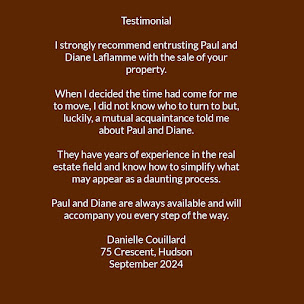What happens inside your head when you choose a home? You may think you're
deciding by logic, but don't be so sure
By Patrick Langston, The Ottawa Citizen
March 7, 2013
You'd buy a sweater on impulse, but when it comes to buying a home it's all
about calm deliberation, right? You might be surprised.
Price, square footage, location: "All that can be trumped by the
visceral reaction of seeing a home," says June Cotte, who teaches
marketing at Western University's
Ivey Business
School.
"Smells, colours, sounds you can hear inside or from the outside - you
might not be aware of them, but they can have an influence."
The layout may even subliminally remind you of the home of a former
boyfriend, says Cotte. That can have a positive or negative emotional impact on
how you perceive a home that's for sale.
In fact, a study published in the Journal of Advertising Research in 2002
said emotions can be twice as important as knowledge in consumer buying
decisions. Subsequent research has determined that the role of emotion in
buying situations varies by individual and circumstance, but there's no doubt
that, overall, it's a critical factor in consumer behaviour.
And while it's important to feel an emotional tie to the place you live in
(it can inspire everything from maintaining the house properly to caring about
your community), abandoning your inner Mr. Spock and his logic isn't wise.
Take aspiration, for example. We judge a potential purchase in part by
whether we think it will represent what we would like to be and how we'd like
to be perceived. An empty nester, however, might actually be happier staying in
peaceful suburbia instead of buying a loft in a noisy downtown area just because
he fancies himself a young-again urban hipster.
As well, we fall victim to confirmation bias, the pervasive tendency to
cherry pick or interpret information that confirms our preconceptions. We fall
in love with a house and so we dismiss the mouldy smell, saying the place just
needs a little airing out.
We also readily become invested psychologically in a property before we've
reached a rational decision, according to professor Michael J. Seiler, who
specializes in behavioural real estate at Old
Dominion University
in Norfolk, Virginia.
"You're looking at a house and suddenly start thinking of the community
and the neighbours and how they'll be your friends.
"Expectations, fears, desire for status - a lot of stuff influences
you," he says. "So be cautious, try to be rational."
Influences are at work before you ever enter a prospective home. Billboard,
newspaper and other advertising, although frequently banal, fosters
expectations, says Cotte.
If a builder advertises extensively, for example, you might make the
illogical assumption that because the company spends oodles of money on
advertising it must be profitable so it must be good. "It's called
accessibility bias," she says. "The most accessible brands, the ones
that immediately come to mind, we value as being positive."
Urbandale general manager
Matthew Sachs says when advertising, "you hook with emotion and reel in
with intellect." A radio ad, for example, might ask, "Remember the
first time you fell in love?" It would then segue from romantic love to love
of a house, tack on some factual benefits - energy efficiency for example,
although Sachs says that might be couched as "comfort" or
"you'll save money" - and exit with another emotional hook.
When it comes to face-to-face sales, Sachs says Urbandale
has no defined strategy except to listen closely to what the prospective buyer
wants.
His advice to home hunters: "Excitement is important if you're buying a
house, but do your research. Validate and verify."
Eric Manherz, a Royal LePage real estate broker in Ottawa,
says a good agent will help clients keep emotions in check and concentrate on
finding what it is they really want. That, he says, takes time and may not be
what they had originally thought.
He also sees peer pressure at work. "People at coffee break say, 'You
should never offer full price.' In some cases, you should. And maybe those
people bought years ago, when the market was different."
Because having too many choices usually means we make no choice, Manherz
suggests after a day of house hunting to scratch most of what you've seen off
your list.
That will also help control what Cotte terms "anchoring and adjustment
bias": if you've seen 20 crummy houses and then one decent one, you'll
assess the decent one as being better than it actually is.
And do not - repeat, do not - feel guilty for making your real estate agent
troop around for days on end or think you have to please him or her by buying.
And what if, by following all this advice, you feel you missed out on the
"perfect" home?
Says Manherz, "There's always another opportunity."








